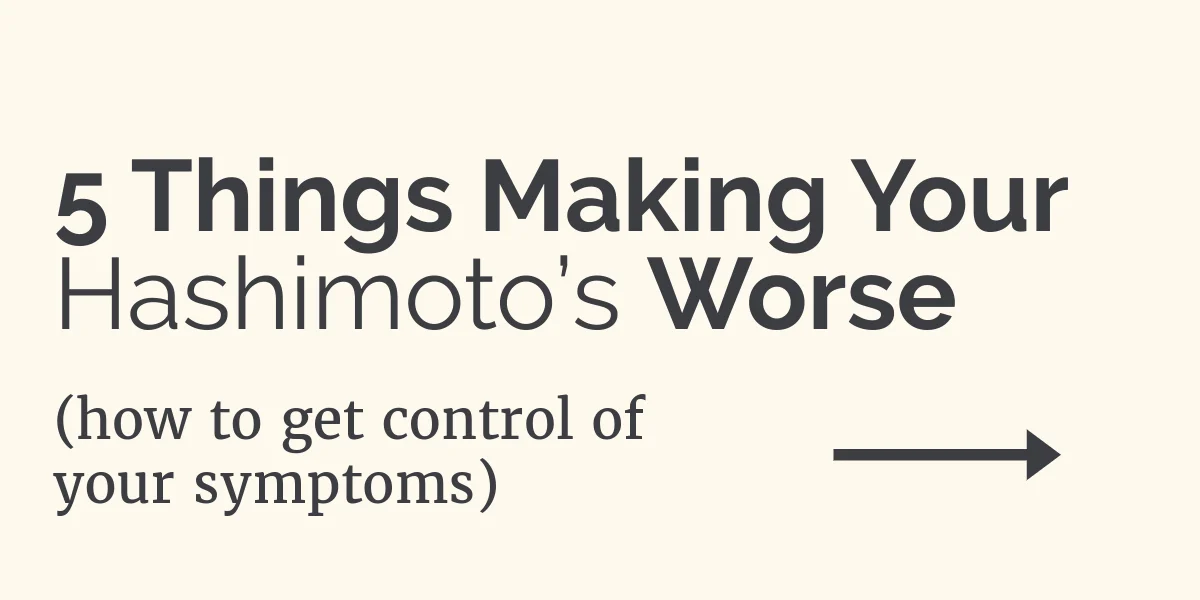Thousands struggle with Hashimoto’s symptoms because they make a few common mistakes that are completely avoidable.
These mistakes are flaring up their symptoms, leading to inflammation, weight gain, and brain fog.
But don’t get discouraged because there are simple fixes for every. Single. One.
Let’s go over each to make sure you aren’t making any (and what to do if you are):
#1. Taking Your Thyroid Meds Incorrectly
You would be surprised by how much bad information exists out there on how to take thyroid medications.
And much of this comes from doctors and pharmacists.
The bottom line is this:
If you take your thyroid medication correctly, it will do its job.
If you don’t, then you will take it and still feel terrible and wonder what’s going on.
If you’ve been haphazardly taking your medication, try this instead:
- Take your thyroid meds only with water
- Take it consistently at the same time each and every day (both morning and night work)
- Take it away from other supplements, food, and beverages
Special note: you CAN take your thyroid meds with other thyroid medications & even with T2 supplements.
But don’t take it with anything else.
If you do this, you will see better absorption of your medication and better symptom control (1).
And if you make the changes we are about to discuss, you may even be able to reduce your dose or even get off your meds entirely.
This brings us to…
#2. Eating Gluten (Even “Occasionally”)
Gluten triggers an autoimmune response in many women with Hashimoto’s, even if you aren’t “gluten sensitive”.
It can damage the gut lining, lead to inflammation (2), and raise thyroid antibodies.
Instead of eating gluten, try this instead:
- Go 100% gluten-free for at least 30 days and see how you feel. Yes, you should do this even if you haven’t been officially diagnosed with Celiac disease or non-celiac gluten sensitivity.
- OR If you find this too difficult, then I have another alternative for you: Keep eating gluten, but switch to ancient grains like Kamut or Einkorn. These ancient grains are much easier to digest, have lower gluten content, contain more nutrients per serving, and have not undergone genetic hybridization like modern wheat has.
I personally can’t handle gluten, but I can easily handle kamut without any issues.
#3. Ignoring Your Gut Health
70% of your immune system lives in your gut, and it’s the site of thyroid hormone conversion and T3 recycling (3).
Gut symptoms like constipation, gas, bloating, and acid reflux all indicate that there’s something wrong with your gut that needs to be addressed.
And if these symptoms aren’t convincing enough for you, remember that they also lead to a condition called “thyroid belly”.

This is a state where your belly protrudes out like you’re pregnant due to a combination of gas, stool, and extra fat.
Treating your gut is one of the fastest ways to slim down your waist as someone with Hashimoto’s.
Do this to improve your gut:
And take a digestive enzyme with each meal. Enzymes are a game-changer for many Hashimoto’s patients because they help you digest your food and absorb more nutrients that can then be sent straight to your thyroid gland for support.
Add a daily probiotic. For someone with Hashimoto’s, you will want to use a combination of soil-based organisms and Saccharomyces boulardii. You can get my recommended supplement for Hashimoto’s here.
Add anti-inflammatory foods to your diet (like bone broth, leafy greens, and ginger). If you clean up your diet, your gut symptoms should reduce by about 80%.
#4. Under-Eating or Over-Exercising
You may think cutting your calories will help you lose weight, but I’m here to tell you that it will only serve to hurt your thyroid.
Daily calorie restriction leads to a process called metabolic adaptation, which is sometimes referred to as starvation mode.
It’s a real process that gets triggered when calories are scarce.
The result is a reduction in your metabolism, lower T3 levels, reduced thyroid conversion, and worse thyroid function.
This happens to everyone who cuts back on their calories, but it happens faster and more aggressively if you have Hashimoto’s.
If you cut your calories, you may lose weight in the short term, but there’s about a 97% chance you will regain it back within 6 months.
This isn’t me just making up numbers, by the way, this is data from research journals (4).
If you want to lose weight, try this instead:
Focus on nourishing your body with high-quality protein, healthy carbohydrates, and lower intensity exercise for longer periods of time (zone-2 training).
These will help balance your hormones (including your thyroid), which will make long-term weight loss feel like a breeze.
#5. Ignoring Low T3 or Poor T4 to T3 Conversion
T3 is the most powerful thyroid hormone, and most doctors never even test for it.
They will tell you that it’s unhelpful or unnecessary and that the only thing you need is the TSH.
But there are many patients out there walking around with a “normal” TSH with continued low thyroid symptoms.
And if you were to look, you’d find that these patients also have low T3.
Instead of just focusing on your TSH, try this instead:
Test your free T3, total T3, and reverse T3. And learn the difference between “normal” and “optimal” thyroid labs.
Optimal ranges for these values are in the top 1/3 of the reference range.
If you aren’t there, implement some natural treatments to give yourself a boost.
The best for increasing free T3 include zinc, selenium, and guggul extract.
Your Next Step
Small changes like these can have a surprisingly big impact on how you feel.
If you’re ready to get your Hashimoto’s under control, try these tips and then let me know how you feel after 30 days.
I think you’ll be surprised by the results.
And if these treatments have you feeling overwhelmed, start with your diet first.
It’s one of the best things you can do for thyroid healing.
You can use my free 7-day Hashimoto’s meal plan here => https://www.restartmed.com/7-day-hashimotos-diet-plan/.
Scientific References
#1. https://pmc.ncbi.nlm.nih.gov/articles/PMC9261378/
#2. https://pmc.ncbi.nlm.nih.gov/articles/PMC8848113/
#3. https://pmc.ncbi.nlm.nih.gov/articles/PMC10884059/
#4. https://pmc.ncbi.nlm.nih.gov/articles/PMC5764193/








